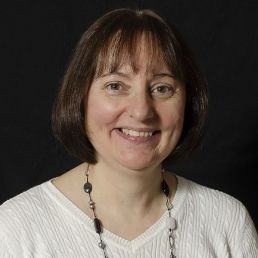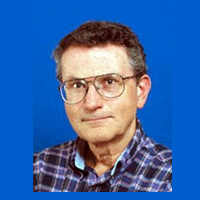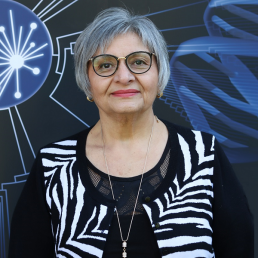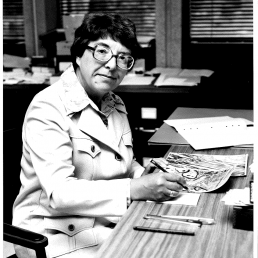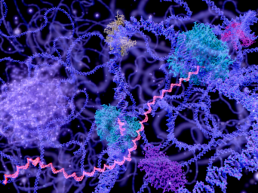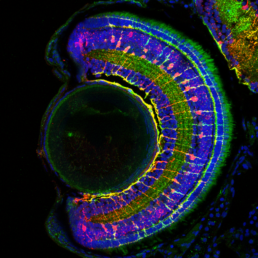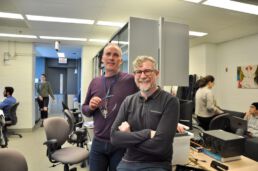Janet Mannone reveals her greatest challenge over 35 years at U of T
Janet Mannone is the Undergraduate Coordinator for CSB, and an expert at responding to the needs of students. She consults, informs and encourages educators within CSB to give our students the best course possible. Her actions refine the remit of our courses and knit our disparate programs together.
This month, Mannone has been recognized for 35 years of service to U of T, and she combines that experience with a commitment to excellence. She has navigated many difficult transitions over 35 years at U of T, but says that her greatest challenge was learning new administrative systems in a web-based environment as they were being developed.
This experience was useful as the pandemic hit in March 2020, ending in-person classes. With tenacity, extensive consultation and a commitment to comprehensive outcomes, she facilitated the department's roll out of online teaching in a short period of time.
We congratulate our valued colleague Janet on her 35 Long Service Award!
Remembering Professor Mike Barrett
It is with sadness that we learned that Professor F Michael Barrett passed away last week. He was an accomplished entomologist who had an important role in supporting our students and making them feel welcome. In CSB and our predecessor, the Department of Zoology, Mike Barrett was a force for collegiality, fairness, and a focus on individual students as well as the student body as a whole.
Barrett taught over 500 undergraduates a year in small and large courses with great care and concern for students. His support is behind the F Michael Barrett Award that recognizes excellence from undergraduate researchers.
His consideration for students was applied to course design and curriculum development across campus. Undergraduate Coordinator Janet Mannone remembers "Mike was able to concern himself with the big picture, such as the quality of our undergraduate programs while focusing on the small details, such as fine tuning course descriptions for the Arts and Science Calendar."
Within the Department, Barrett always worked to raise up others. He submitted nominations for staff awards and advocated for promotion of junior faculty. Professor Ellie Larson asserts that "He was an energetic force for 'improvement' in the department and society, where his stature increased without pushing anyone else down."
Barrett's early teaching duties included courses on reproduction, which lead to decades of involvement in the field of human sexuality. He had a particular interest in promoting the sexual health and wellbeing of people with disabilities. Barrett was Executive Director of the Sex Information and Education Council of Canada (SIECCAN) and Editor of the Canadian Journal of Human Sexuality from 1992 to 2016.
Please follow the link for more details from his family and friends on his "generous, compassionate and loving nature".
CSB's Tamar Mamourian recognized for 35 years of outstanding service to U of T
Everyone in Cell & Systems Biology is familiar with the smiling face and focused tone of our Chief Administrative Officer Tamar Mamourian. She is always available to facilitate solutions to a problem, suggest more sensible alternatives, or sometimes just listen.
Tamar combines her keen perceptions with a deep understanding of the workings of the University that comes from 35 years of service. That service has been recognized by the University through the 35 Long Service Award. This Award recognizes the role she has played in the success of our institution, her commitment to excellence, and cites the benefits her efforts have yielded for her colleagues and our students.
We give our warmest congratulations to our cherished colleague, Tamar Mamourian.
In Memoriam: Professor Betty Ida Roots
The University of Toronto Community lost an eminent scholar on October 24th with the passing of Professor Betty Ida Roots, PhD, DSc, FRSC. She served the University in a number of roles; as Professor at U of T from 1969, Assistant Chair of Zoology beginning in 1972, Associate Dean of Science at UTM (then Erindale College) from 1976 and Chair of the Department of Zoology (now CSB and EEB) from 1984-1990. Roots planned, established, and directed the Electron Microscope Facility at UTM. One of her many lasting legacies is the collaborative Ph.D. program in Neuroscience at the University of Toronto, which she initiated and developed. Her friend Professor Ellie Larsen describes her as “not only a successful scientist but also a very fine leader”.
Breaking barriers: Quebec platelet disorder
A decade after the discovery that Quebec Platelet Disorder is caused by a tandem duplication, the Mitchell laboratory and collaborators demonstrate that this causes the additional copy of the duplicated PLAU gene to be on the opposite side of a CTCF genomic boundary. As a consequence, the extra copy is not insulated from the effects of a transcriptional enhancer of the adjacent VCL gene, resulting in a high level of transcription. This phenomenon is known as “enhancer hijacking”.
Read More Here
This research has been published as "Enhancer-gene rewiring in the pathogenesis of Quebec platelet disorder"
Building excellence in research and teaching: CSB’s new Chair Nicholas Provart
Professor Nick Provart likes building things; he even used his carpentry skills to expand his children’s treehouse while working from home (without losing any fingers). As the new Chair of the Department of Cell & Systems Biology (CSB), he now has the opportunity to build up the academic excellence of the Department.
Building on the strength infused into CSB by the previous Chair, Vincent Tropepe, Provart will guide a department that is world class in life sciences, research, and teaching initiatives. When considering his new role, he also received valuable advice from previous Chairs Daphne Goring and John Coleman.
Provart started at University of Toronto in 2002 as an early leader in data science at the Department of Botany (now part of CSB). His laboratory established the Botany Affymetrix Resource (BAR), developing user-friendly techniques and tools for visualizing genome-wide, tissue-specific gene expression that have evolved along with the latest advances in genomics technology.
CSB is building on this Departmental expertise in data science by developing a Professional Masters in Biological Data Science. Provart anticipates this will provide benefits to graduates in finding jobs in labs, agencies or startups, and will provide productive cross-fertilization with graduate students working at the lab bench.
Provart feels “fortunate to be part of a pretty diverse and inclusive Department, University, and City”. Along with ensuring diversity of hires, he will encourage presenting a wide range of voices to be heard as speakers inside and outside the Department.
Provart has been teaching online since 2014. When in-person lectures moved online due to COVID-19, he adapted quickly to delivering his Bioinformatic Methods course entirely online. He shares his extensive experience in online instruction as a Fellow in the Faculty of Arts & Science’s Online Learning Academy.
“I hope I will be able to help CSB and other faculty across Arts & Science get up to speed in terms of pivoting to online learning this fall” Provart says. Once in-person classes return, he will strengthen CSB’s experiential learning opportunities in upper level courses and through the Bioinformatics and Computational Biology program at CSB.
Provart believes the CSB has a “hugely important” role in promoting science outside the University, through supporting organizations like Let’s Talk Science and iGEM Toronto. “From my perspective, it was amazing to see the interest of the public at last year’s Science Rendezvous”, an outdoor science festival where CSB presented its science alongside other U of T Departments. “These community building and outreach efforts are an important aspect to us as scientists.”
Congratulations to CSB’s new Chair, Nicholas Provart!
CSB researcher awarded Provost’s Postdoctoral Fellowship
We are pleased to announce that Dr Ian Tobias has won a Provost’s Postdoctoral Fellowship to pursue research at Professor Jennifer Mitchell’s laboratory in Cell & Systems Biology. He will study how growth of stem cells differs between species.
Dr Tobias will examine regions of DNA called enhancers that can turn genes off and on without changing the protein they control. The evolution of new traits between species is known to mainly occur by alterations in regions of DNA (including enhancers) that are found outside of genes. He will determine whether activators that bind to enhancers have changed as animals evolved into different species, and how this affects the development of stem cells into the organs of the body. This follows on from his PhD work, where Dr Tobias demonstrated that the signals in the cellular environment that support stem cells are different in dogs compared with mice and humans.
This research has important implications for using stem cells to treat humans using regenerative medicine; with many stem cell studies conducted in worms, fish or mice, it is important to understand differences between species to unlock potential stem cell therapies for humans.
The goal of the Provost Postdoctoral Fellowship is to increase opportunities for hiring postdoctoral fellows from underrepresented groups, specifically Indigenous and/or Black researchers, and strengthen the research environment at the University with diverse perspectives. Dr Tobias is a member of the Chippewas of Nawash First Nation.
Prof Vince Tropepe's lab using zebrafish as a vertebrate model for Usher Syndrome-linked blindness
CSB Chair Vincent Tropepe has received funding from Fighting Blindness Canada to conduct research using zebrafish to study Usher syndrome, a genetic condition that results in hearing and vision loss. Loss of vision in Usher syndrome is the result of retinal degeneration, but the mechanism through which degeneration happens in unknown.
Clues to the way retinal degeneration happens in Usher syndrome can be found in the zebrafish model organism. The gene that is altered in 20% of humans with Usher syndrome is also present in zebrafish, and mutations in zebrafish that mimic the Usher-linked changes in this 'protocadherin' gene can result in reduced hearing and vision.
When the zebrafish protocadherin protein Pcdh15b is mutated in the lab, the integrity of the outer segment of retinal cells, the region that captures light, is compromised. Mutants have a progressive loss of photoreceptor outer segments, which can be attenuated by darkness or exacerbated by light exposure.
The Tropepe lab will characterize the subcellular defects that underscore photoreceptor degeneration, identify Pcdh15b-binding proteins to reveal novel Pcdh15-dependent mechanisms for photoreceptor maintenance, and catalogue the different forms of Pcdh15b to identify ones that will prevent retinal degeneration as a potential gene therapy.
We are grateful to Fighting Blindness Canada for their support; you can read more about their funded research and also donate to them here.
CSB neurobiologists identify switch that turns muscles on and off during sleep
CSB Professor John Peever, CSB PhD grad Zoltan Torontali and CSB RA Jimmy Fraigne have demonstrated a new link between arousal and muscle paralysis in mice using behavioral, electrophysiological, and chemogenetic strategies in a paper in Current Biology.
During REM sleep, muscle paralysis is induced by a region of the brain called the Sublaterodorsal Tegmental Nucleus (SLD). Involuntary muscle paralysis during wakefulness can occur in the natural phenomenon of cataplexy, whereas sleep is involuntarily induced in narcolepsy.
Prof Peever’s lab found that activation of SLD neurons in both narcoleptic and normal mice promotes cataplexy, whereas SLD silencing prevents cataplexy. This region of the brain therefore couples arousal state and motor activity during REM sleep and wakefulness.
This new understanding has the potential to treat muscular disorders in humans. In Parkinsons’s disease, the affected person’s muscles are in a continual state of rigour during wakefulness, but this rigour relaxes during REM sleep. Prof Peever dreams of helping Parkinson’s patients by applying this new understanding of the SLD to tune their muscle tension during wakefulness.
You can read more about this insight in a story from UofT News and in the Current Biology paper.
Neuroscientist Dr Jessica Pressey joins CSB in 2020 as Assistant Professor, Teaching Stream
We are fortunate to have recruited Jessica Pressey to CSB as an Assistant Professor, Teaching-Stream (3-year CLTA) as of Jan 1, 2020. Professor Pressey graduated with a PhD from Dean Woodin's lab in 2015 and completed postdoctoral research at INSERM's Institut du Fer à Moulin in Paris, France.
Her field of expertise is synaptic transmission, neuroplasticity, and brain development and as such she will be a valuable addition to CSB's Animal Physiology Major program and for CSB research project course students studying electrophysiology.
Congratulations, Professor Pressey!

